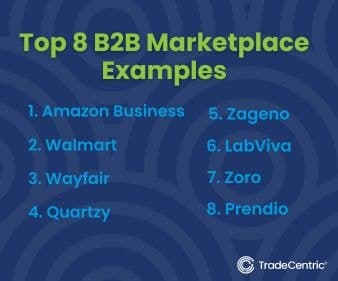Table of Contents
B2B Marketplaces You Should Know
Specialized platforms have emerged that cater to online marketplaces across diverse industries, offering tailored solutions for procurement and inventory management. Vertical marketplaces can range from home goods and industrial supplies to life sciences and biotech. B2B marketplace platforms provide a seamless purchasing experience by connecting users with a vast array of products and suppliers.
Lets explore leading examples of B2B marketplaces across different industries and how they’re reshaping the procurement landscape. Each excels by simplifying the buying process, enhancing efficiency, and delivering valuable resources to its customers.

1. Amazon Business
Amazon Business is a B2B marketplace designed to meet the procurement needs of businesses of all sizes. It offers a wide range of products from multiple suppliers, allowing companies to streamline their purchasing processes. With features such as bulk pricing, business-only selection, multi-user accounts, and integration with procurement systems, Amazon Business helps organizations save time and money. It also provides detailed analytics and reporting, enabling businesses to track spending, manage budgets, and make informed purchasing decisions.
2. Walmart
Walmart Business Marketplace is an online platform designed to cater to the unique needs of businesses and nonprofit organizations. It offers a wide range of products across various categories, including office supplies, electronics, and breakroom essentials, providing bulk purchasing options and exclusive pricing tailored for business customers. The platform also integrates features that help businesses streamline their purchasing processes, making it easier to manage supplies and inventory. By leveraging Walmart’s vast network and resources, the Walmart Business Marketplace aims to simplify procurement for organizations of all sizes.
3. Wayfair
Wayfair is a prominent online retailer specializing in home furnishings and décor, offering an extensive range of products, including furniture, kitchenware, and accessories. Established in 2002, Wayfair connects millions of customers to over 14 million items sourced from thousands of suppliers around the globe. This platform can be used for both business-to-business as well as business-to-consumer transactions and is praised for its easy-to-navigate interface, competitive pricing, and a wealth of customer reviews. This makes it a go-to destination for both residential and commercial buyers looking to furnish and decorate their spaces.
4. Quartzy
Quartzy is an online platform combining a marketplace with lab management tools designed to optimize laboratories’ ordering and inventory processes. It provides scientists and researchers with a comprehensive selection of lab supplies, including chemicals, reagents, and equipment. Quartzy’s platform features capabilities like order tracking, inventory control, and budget management, all aimed at helping labs run more efficiently and cost-effectively.
One of Quartzy’s standout features is its integrated lab management tools, which streamline the ordering process, reduce administrative overhead, and enhance operational efficiency. Business buyers can easily track orders, manage inventory, and monitor budgets from a user-friendly interface. Quartzy’s inventory management system allows labs to keep accurate records of their supplies, set automatic reorder points, and ensure that critical items are always in stock, reducing downtime and keeping experiments on track.
Read more about how Quartzy leverages B2B Connected Commerce to maximize marketplace adoption.
5. Zageno
Zageno is an online marketplace platform tailored for life sciences. It offers a wide range of lab supplies, reagents, and equipment from multiple vendors. The platform is designed to streamline the purchasing process for researchers by offering a centralized location where they can compare products, read reviews, and access detailed product information. Zageno enhances the procurement experience with its user-friendly interface and comprehensive support services.
The platform is designed to address the unique challenges researchers and laboratory managers face from a business-to-business perspective, offering tools and features that enhance the purchasing experience. Business buyers can easily search for and compare products from multiple suppliers, access detailed product information, and read reviews from other scientists within a cohesive interface. This allows researchers to make informed purchasing decisions based on product specifications, pricing, and peer feedback.
6. LabViva
LabViva is a marketplace platform that connects scientists and researchers with a diverse selection of life science products. The platform seamlessly integrates scientific data with procurement systems to provide a smooth and efficient purchasing process. Featuring products from leading suppliers and manufacturers, LabViva offers detailed technical information and comparison tools, enabling researchers to make well-informed purchasing decisions.
LabViva’s integration of complex scientific data directly into the wholesale marketplace sets it apart. The platform is designed to simplify purchasing and provide users with detailed, relevant scientific information to aid in product selection. Each product listing is enriched with technical data, application notes, and peer-reviewed publications, enabling researchers to make informed decisions based on the latest scientific knowledge. This helps labs select the most appropriate products for their specific experimental needs — a very different approach than most business models.
7. Zoro
Zoro is an eCommerce retailer offering a wide array of industrial supplies, tools, and equipment. Serving both businesses and individual consumers, Zoro provides products across various categories, including maintenance, repair, operations (MRO), safety, electrical, and plumbing. Known for its extensive inventory and competitive pricing, Zoro simplifies the procurement process, making it more efficient for its customers, whether it be small businesses, independent retailers, or a larger organization.
The product catalog is more robust than most online platforms and spans millions of items across a wide range of categories, including safety gear, electrical components, plumbing supplies, office products, and janitorial equipment. This extensive selection ensures that customers can find everything they need to maintain and operate their businesses efficiently in one convenient location.
Zoro’s commitment to offering competitive pricing on its products makes it an attractive option for businesses looking to optimize their procurement budgets.
8. Prendio
Prendio is a procurement platform designed for biotech and life sciences. It simplifies the purchasing process for biotech companies by integrating with lab management systems and offering access to a wide network of suppliers. Prendio focuses on enhancing digital marketing through procurement efficiency, reducing costs, and creating compliance with industry-specific standards.
One of Prendio’s core strengths is its integration with existing lab management and enterprise resource planning (ERP) systems. Labs synchronize their procurement processes with inventory management, financial tracking, and project management, resulting in a unified workflow that enhances efficiency and reduces administrative burdens. By automating many aspects of the purchasing process, Prendio helps labs save time and focus more on their scientific endeavors.
These B2B marketplace platforms examples represent various industries’ diverse and specialized needs, from home goods and industrial supplies to life sciences and biotech. Each excels in offering tailored solutions that simplify procurement, enhance efficiency, and support compliance with industry standards.
Ready to integrate your platform to a B2B marketplace?
How to Connect Buyer eProcurement Platforms to These B2B Marketplace Examples
Integrating buyer eProcurement platforms with a B2B marketplace is not straightforward. Buyers use many different eProcurement solutions, each with unique integration requirements. That makes it challenging to offer integration and automation features such as:
TradeCentric provides the technology and support marketplace operators need to overcome B2B integration challenges and connect with their buyers. Curious how TradeCentric connects buyers and suppliers? Learn more.
The TradeCentric Platform Helps:
- B2B buyers integrate B2B marketplace platforms with their eProcurement or ERP platforms.
- B2B marketplaces offer features such as PunchOut catalogs and Purchase Order Automation to buyers.
- B2B suppliers offer more diverse purchasing methods to their buyers who have invested in eProcurement platforms.
Looking to connect with trading partners on today’s top B2B marketplaces?




